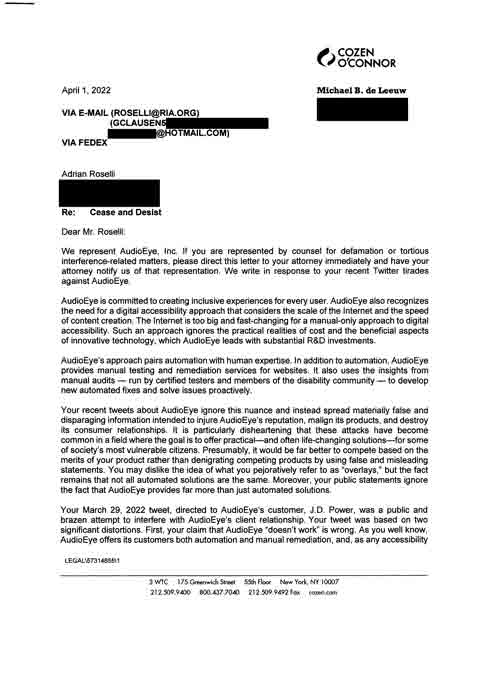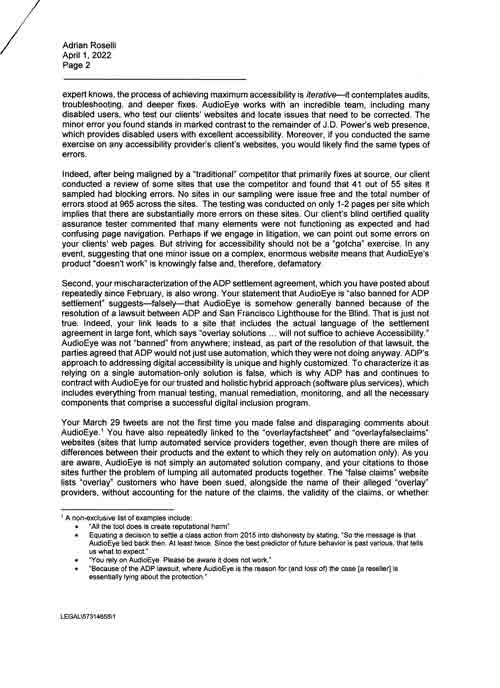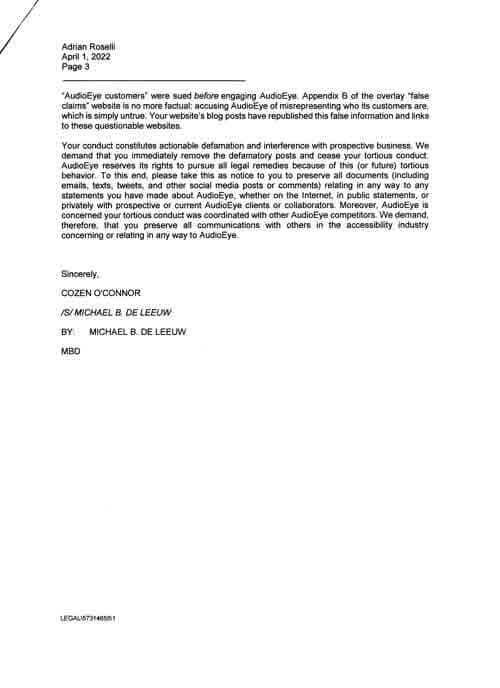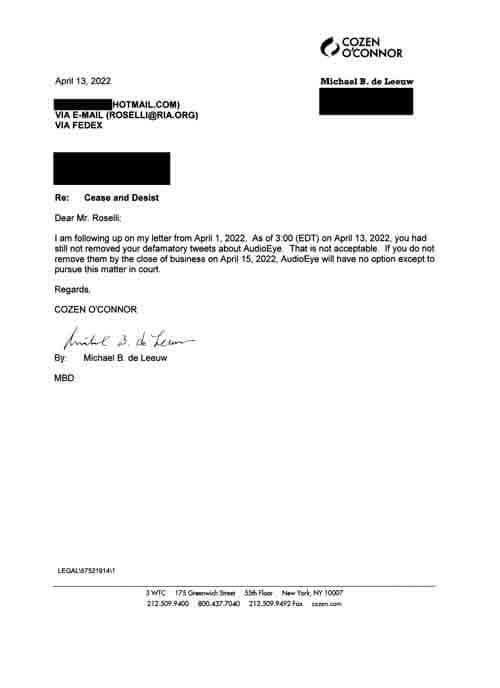My Cease & Desist from AudioEye
On Tuesday April 5, 2022, a FedEx driver dropped off an overnight envelope from Manhattan. It contained a three page Cease & Desist letter from Cozen O’Connor, the law firm representing AudioEye, Inc.
On Thursday April 14, 2022, I received a follow-up letter by the same delivery method. I scanned each letter, ran OCR on them, and embedded an image and text version of each here.




The First Letter from AudioEye
April 1, 2022
VIA E-MAIL
(ROSELLI@RIA.ORG)
(GCLAUSEN5@[REDACTED])
([REDACTED]@HOTMAIL.COM)VIA FEDEX
Adrian Roselli
[REDACTED]Re: Cease and Desist
Dear Mr. Roselli:
We represent AudioEye, Inc. If you are represented by counsel for defamation or tortious interference-related matters, please direct this letter to your attorney immediately and have your attorney notify us of that representation. We write in response to your recent Twitter tirades against AudioEye.
AudioEye is committed to creating inclusive experiences for every user. AudioEye also recognizes the need for a digital accessibility approach that considers the scale of the Internet and the speed of content creation. The Internet is too big and fast-changing for a manual-only approach to digital accessibility. Such an approach ignores the practical realities of cost and the beneficial aspects of innovative technology, which AudioEye leads with substantial R&D investments.
AudioEye’s approach pairs automation with human expertise. In addition to automation, AudioEye provides manual testing and remediation services for websites. It also uses the insights from manual audits – run by certified testers and members of the disability community – to develop new automated fixes and solve issues proactively.
Your recent tweets about AudioEye ignore this nuance and instead spread materially false and disparaging information intended to injure AudioEye’s reputation, malign its products, and destroy its consumer relationships. It is particularly disheartening that these attacks have become common in a field where the goal is to offer practical-and often life-changing solutions-for some of society’s most vulnerable citizens. Presumably, it would be far better to compete based on the merits of your product rather than denigrating competing products by using false and misleading statements. You may dislike the idea of what you pejoratively refer to as “overlays,” but the fact remains that not all automated solutions are the same. Moreover, your public statements ignore the fact that AudioEye provides far more than just automated solutions.
Your March 29, 2022 tweet, directed to AudioEye’s customer, J.D. Power, was a public and brazen attempt to interfere with AudioEye’s client relationship. Your tweet was based on two significant distortions. First, your claim that AudioEye “doesn’t work” is wrong. As you well know, AudioEye offers its customers both automation and manual remediation, and, as any accessibility expert knows, the process of achieving maximum accessibility is iterative-it contemplates audits, troubleshooting, and deeper fixes. AudioEye works with an incredible team, including many disabled users, who test our clients’ websites and locate issues that need to be corrected. The minor error you found stands in marked contrast to the remainder of J.D. Power’s web presence, which provides disabled users with excellent accessibility. Moreover, if you conducted the same exercise on any accessibility provider’s client’s websites, you would likely find the same types of errors.
Indeed, after being maligned by a “traditional” competitor that primarily fixes at source, our client conducted a review of some sites that use the competitor and found that 41 out of 55 sites it sampled had blocking errors. No sites in our sampling were issue free and the total number of errors stood at 965 across the sites. The testing was conducted on only 1-2 pages per site which implies that there are substantially more errors on these sites. Our client’s blind certified quality assurance tester commented that many elements were not functioning as expected and had confusing page navigation. Perhaps if we engage in litigation, we can point out some errors on your clients’ web pages. But striving for accessibility should not be a “gotcha” exercise. In any event, suggesting that one minor issue on a complex, enormous website means that AudioEye’s product “doesn’t work” is knowingly false and, therefore, defamatory.
Second, your mischaracterization of the ADP settlement agreement, which you have posted about repeatedly since February, is also wrong. Your statement that AudioEye is “also banned for ADP settlement” suggests-falsely-that AudioEye is somehow generally banned because of the resolution of a lawsuit between ADP and San Francisco Lighthouse for the Blind. That is just not true. Indeed, your link leads to a site that includes the actual language of the settlement agreement in large font, which says “overlay solutions … will not suffice to achieve Accessibility.” AudioEye was not “banned” from anywhere; instead, as part of the resolution of that lawsuit, the parties agreed that ADP would not just use automation, which they were not doing anyway. ADP’s approach to addressing digital accessibility is unique and highly customized. To characterize it as relying on a single automation-only solution is false, which is why ADP has and continues to contract with AudioEye for our trusted and holistic hybrid approach (software plus services), which includes everything from manual testing, manual remediation, monitoring, and all the necessary components that comprise a successful digital inclusion program.
Your March 29 tweets are not the first time you made false and disparaging comments about AudioEye.1 You have also repeatedly linked to the “overlayfactsheet” and “overlayfalseclaims” websites (sites that lump automated service providers together, even though there are miles of differences between their products and the extent to which they rely on automation only). As you are aware, AudioEye is not simply an automated solution company, and your citations to those sites further the problem of lumping all automated products together. The “false claims” website lists “overlay” customers who have been sued, alongside the name of their alleged “overlay” providers, without accounting for the nature of the claims, the validity of the claims, or whether “AudioEye customers” were sued before engaging AudioEye. Appendix B of the overlay “false claims” website is no more factual: accusing AudioEye of misrepresenting who its customers are, which is simply untrue. Your website’s blog posts have republished this false information and links to these questionable websites.
Your conduct constitutes actionable defamation and interference with prospective business. We demand that you immediately remove the defamatory posts and cease your tortious conduct. AudioEye reserves its rights to pursue all legal remedies because of this (or future) tortious behavior. To this end, please take this as notice to you to preserve all documents (including emails, texts, tweets, and other social media posts or comments) relating in any way to any statements you have made about AudioEye, whether on the Internet, in public statements, or privately with prospective or current AudioEye clients or collaborators. Moreover, AudioEye is concerned your tortious conduct was coordinated with other AudioEye competitors. We demand, therefore, that you preserve all communications with others in the accessibility industry concerning or relating in any way to AudioEye.
Sincerely,
COZEN O’CONNOR
/S/ MICHAEL B. DE LEEUW
BY: MICHAEL B. DE LEEUW
MBD1 A non-exclusive list of examples include:
- “All the tool does is create reputational harm”
- Equating a decision to settle a class action from 2015 into dishonesty by stating, “So the message is that AudioEye lied back then. At least twice. Since the best predictor of future behavior is past various, that tells us what to expect.”
- “You rely on AudioEye. Please be aware it does not work.”
- “Because of the ADP lawsuit, where AudioEye is the reason for (and loss of) the case [a reseller] is essentially lying about the protection.”
The Second Letter from AudioEye
April 13, 2022
([REDACTED]@HOTMAIL.COM)
VIA E-MAIL (ROSELLI@RIA.ORG)
VIA FEDEXAdrian Roselli
[REDACTED]Re: Cease and Desist
Dear Mr. Roselli:
I am following up on my letter from April 1, 2022. As of 3:00 (EDT) on April 13, 2022, you had still not removed your defamatory tweets about AudioEye. That is not acceptable. If you do not remove them by the close of business on April 15, 2022, AudioEye will have no option except to pursue this matter in court.
Regards,
COZEN O’CONNOR
By: Michael B. de Leeuw
MBD
My Response
I wrote the following response to Cozen O’Connor, the law firm representing AudioEye, Inc., and delivered it via email as an accessible PDF.
April 15, 2022
Michael B.de Leeuw
Cozen O’Connor
3 WTC
175 Greenwich Street
55th Floor
New York, NY 10007
[REDACTED]@cozen.comMr. de Leeuw,
I received your April 1 cease & desist letter sent on behalf of AudioEye, Inc. I also received your April 13 letter threatening legal action.
For electronic communication, the email addresses you have on file are not correct. I am not sure where you found them, but only one of them was ever mine and that was as an employee for a job I left in 1997. The address from which I sent this is my current email address. You do not have my permission to re-sell it.
Your letter identifies my tweets to JDPower as the cause of your client’s request, which I have identified as having the following URLs:
- https://twitter.com/aardrian/
status/1508898713976119309 - https://twitter.com/aardrian/
status/1508898715624484870 - https://twitter.com/aardrian/
status/1508898717121794062 In the interests of being an independent, self-employed, sole-practitioner business who does not have the financial resources of AudioEye, let alone legal counsel, I have deleted the tweets to satisfy your client’s request.
Deleting the tweets should in no way be taken as a sign that I agree with your client’s assertions as laid out in the letter. It is still my genuine opinion and sincerely held belief that the tweets were accurate.
When you visit those URLs, you can confirm the tweets are gone. You can also confirm those were the correct URLs since the tweets have been archived at the Internet Archive at the following URLs, which match from the “/https” forward:
- https://web.archive.org/
web/20220329200832/ https://twitter.com/aardrian/ status/1508898713976119309 - https://web.archive.org/
web/20220329201044/ https://twitter.com/aardrian/ status/1508898715624484870 - https://web.archive.org/
web/20220329200749/ https://twitter.com/aardrian/ status/1508898717121794062 Now I want to address points in your letter with which I disagree or think are demonstrably false. It is a non-exhaustive list.
You claim my tweets “spread materially false and disparaging information intended to injure AudioEye’s reputation, malign its products, and destroy its consumer relationships.” This is not my intent at all. My intent is to help end users, something I know AudioEye also claims. My tweets cite sources, demonstrate failures, and give historical context. My opinions are my own, and are informed by this information. I have no intent to injure AudioEye’s reputation, though I point out historical statements and actions from AudioEye that others can use to form their own opinions. I am not maligning AudioEye’s products, I am identifying and documenting gaps. And I am in no position to affect AudioEye’s consumer relationships—partly because I am one person have no contact with any of its customers.
Your letter seems to make some assumptions about my relationship with AudioEye. You say “… it would be far better to compete based on the merits of your product …”, which implies that AudioEye and I are competitors. This could not be further from the truth. I do not offer web accessibility remediation services. I have no overlay nor remediation product, either. I am a consultant. I train, I test, I coach.
It also states, “You may dislike the idea of what you pejoratively refer to as ‘overlays,’” but I want to point out that is not my term. That is the term the industry landed on, and I had no hand in it. It is also the term used in the ADP / San Francisco LightHouse settlement agreement.
You go on to say, “Moreover, your public statements ignore the fact that AudioEye provides far more than just automated solutions.” This is irrelevant. Prior to that tweet, I had no insight into its non-automated solutions. I have consistently addressed the overlay product itself and where it fails to work effectively.
Regarding my JDPower tweet, you assert “two significant distortions”:
“First, your claim that AudioEye ‘doesn’t work’ is wrong. … The minor error you found stands in marked contrast to the remainder of J.D. Power’s web presence…” My initial statement (“doesn’t work”), brief due to Tweet character limitations, is my sincerely held belief based on working with end users and evaluating screens. That you acknowledge I found an issue outside of AudioEye’s overlay product, which self-identified AudioEye testers did not fix after two tries and finally addressed by completely deleting the control, seems to validate my sincerely held belief.
You go on to say “Perhaps if we engage in litigation, we can point out some errors on your clients’ web pages.” I can assure you do not need to pursue litigation to find errors on my client sites. You can do that for free. The difference is that I have never claimed to get my clients “compliant on day one” (AudioEye tweet at https://twitter.com/audioeyeinc/
status/1357340661041623044 ) or asserted they would be “protected [from accessibility lawsuits] from day one” (AudioEye tweet at https://twitter.com/audioeyeinc/status/1351955182326841346 ).You continue, “In any event, suggesting that one minor issue on a complex, enormous website means that AudioEye’s product ‘doesn’t work’ is knowingly false and, therefore, defamatory.” Again, my assertion about AudioEye’s overlay product being ineffective is my sincerely held belief based on working with end users and evaluating screens. It is not false when I can demonstrate it. Which I am happy to do.
For your second asserted “significant distortion”:
“Second, your mischaracterization of the ADP settlement agreement … statement that AudioEye is ‘also banned for ADP settlement’ suggests-falsely-that AudioEye is somehow generally banned because of the resolution of a lawsuit between ADP and San Francisco Lighthouse for the Blind.” This strikes me as intentionally mis-reading my character-constrained tweet. When I refer to “AudioEye” in my tweets, I am generally referring to its overlay product, barring exceptions for referencing its marketing messages, stock price, or its securities fraud settlement (as examples). I think a reasonable reader would understand that.
You acknowledge that I link to the site with the language from the settlement, which acts as the citation for my statement. I opted to share the link, as evidence for my sincerely held belief, as opposed to selectively quoting it.
You then go on to say, “your link leads to a site that includes the actual language of the settlement agreement in large font, which says ‘overlay solutions … will not suffice to achieve Accessibility.’” That ellipsis in the statement you quote is excluding an important phrase, which I am including in bold italic as I include the entirety of the phrase: “‘overlay’” solutions such as those currently provided by companies such as AudioEye and AccessiBe will not suffice to achieve Accessibility.”
You continue to assert I made false or disparaging comments. You reference four tweets but do not link them, so I am doing so in the interest of completeness:
- https://twitter.com/aardrian/
status/1508898717121794062 — this is the third tweet in my tweet to JDPower and is both my opinion and my sincerely held belief. Regardless, I have deleted it as your client demanded.- https://twitter.com/aardrian/
status/1508909066118119432 — this is a response to an anonymous account who claimed that AudioEye’s 2015 class action securities fraud settlement for ~$1.5 million USD is old news, to which my response was my genuinely held belief that when a company settles a fraud case for that much money it can taint public perception of them for years to come. There is nothing false or disparaging here.- https://twitter.com/aardrian/
status/1508898713976119309 — the original JDPower tweet, which I have deleted as your client demanded.- https://twitter.com/aardrian/
status/1490787825503068164 — genuinely an older tweet, and one which links to the settlement language cited above. Also my sincerely held belief that WPEngine made a disappointing decision.None of those is false. None of those is disparaging. They are a combination of my opinion, my sincerely held belief, and referenced court cases.
You continue by asserting that linking to Overlay Fact Sheet and Overlay False Claims is somehow false or disparaging. It is my understanding linking to a widely-referenced site is itself not disparaging, and certainly not false since those sites exist. If your client genuinely disagrees with the content at either of those sites, I am confident you will be asked to send them Cease & Desist letters as well.
Your letter starts to wrap up by asking me to “preserve all documents (including emails, texts, tweets, and other social media posts or comments) relating in any way to any statements you have made about AudioEye, whether on the Internet, in public statements, or privately with prospective or current AudioEye clients or collaborators.” This is easy since I strive to keep all my criticisms and interactions with overlay vendors public. Which is why I have published the two letters you sent me, and this response, to my personal web site.
To my knowledge, I have had no interactions with AudioEye clients or collaborators. If you can provide me a current and complete list of all AudioEye clients or collaborators I am happy to review it.
Finally, you close with this statement: “Moreover, AudioEye is concerned your tortious conduct was coordinated with other AudioEye competitors. We demand, therefore, that you preserve all communications with others in the accessibility industry concerning or relating in any way to AudioEye.” I want to take this chance to re-assert that I am not an AudioEye competitor. Not only that, I have not coordinated with any other overlay vendors. I am happy to preserve any communications because there aren’t any.
I appreciate that there are people at AudioEye who genuinely want to make the web more accessible. We are fighting the same fight. AudioEye spending any money to threaten me with legal action is taking money away from AudioEye’s effort to improve the web and my time to do the same. Moreover, threatening genuine criticisms with expensive legal action is not in the best interests of those we both claim to want to help —users with varying needs, challenged by the state of the web today. Instead AudioEye’s legal threats can have a chilling effect on the kind of open discourse and de facto peer review on which our industry has grown to affect real change. I encourage AudioEye to embrace valid criticism in the spirit it is intended — generating better outcomes for users.
Annoyedly,
Adrian Roselli
Independent Digital Accessibility Consultant
Not a Bird Lawyer
11 Comments
Maybe they should concentrate on the problems with their own website first? I had never gone to their website before reading this post and within minutes I was able to completely break their top menu nav using just the keyboard. Currently I have all four of the submenus visible at the same time and I am not able to either hide them or navigate within them. Also, there are tab stops that I cannot see the focus indicator. They may claim to be experts on accessibility but they apparently forgot to hire developers competent enough to implement a simple nav menu. Hopefully they don’t send me a C&D for this comment.
Very well stated my friend! Keep up the good fight, we are all here with you! By the way, I have never met one of their “testers“ have you? Why don’t they come out to the community and speak on the positives that we are “possibly“ missing?
In response to . Mike, to my knowledge I have never met one of their testers. I have only interacted with two self-identified AudioEye testers, as I allude in my letter. You can see my tweet response to the first and my video tweet response to the second. You can also see the tweet where I acknowledge AudioEye fixed the issue on the third try.
In my opinion, these actions are not only chilling, they are abusive and incredibly thuggish. If I were to ponder on the reasons why they would take such chilling actions, I would probably land on the fact that they can only react out of fear, brute force, and lies in a misguided belief that they can silence criticisms. I would probably even go on to think that it is such a shame bullies such as this are allowed to do what they do, and I would almost certainly hope that this and other accounting of their mob-like tactics dressed up in legal actions is brought to the attention of their future prospective clients and relevant investigatory bodies. But hey, that’s just me thinking about what I would maybe ponder, you know?
Sending you love, moral support, gratitude, and respect. I’m sorry that this has happened to you.
It’s like they’ve never heard of the Streisand effect.
I really appreciate all you do to keep these companies practices in the open and make the web better!
Should this continue Adrian I do think you have entirely reasonable grounds to ‘demand’ a complete list of all prospective AudioEye clients or collaborators. You cannot comply with their initial demand without a complete list , of course.
I think you were very adult in omitting that demand in your reply, as annoyed as you may be.
Loving the Streisand multiplier.
“Annoyedly,
Adrian Roselli”❤️
Did you consider creating a “donation box” to raise money for a legal dispute?
In response to . Martin, I have. My expectation is that it will not be necessary.
Keep this page and content active. Rather than fixing their issues, such a threatening letter from lawyer is showing AudioEye management mentality. So sick and cheap!
I will never recommend AudioEye to any client.
They owe you a public apology and compensation for this letter.
That letter reads like it was drafted by an overtly aggressive and unsupervised marketing intern working late night into a holiday weekend’s Friday. Its incorrect title, “Re: Cease and Desist”, mixed tone, weak arguments and foolish signature date leave me screaming, “fake!”
Annoyedly for you,
Pat
Leave a Comment or Response